Editor’s Note: Technology, startups, entrepreneurship, unicorns, S-1s. Silicon Valley has created an economic engine unlike any other in the world over the past few decades. That success has come with incredible influence over our society, politics, and economy, an influence that is increasingly under the microscope. Our industry has gained outsized power, and now it needs to meet that power with outsized responsibility.
In a new series for TechCrunch Extra Crunch, Greg Epstein, the humanist chaplain at Harvard and MIT, will interrogate issues of ethics and how they apply to technology and startups today. As Epstein writes:
In 2018 I joined MIT in addition to my role at Harvard, and the experience of becoming a chaplain at what is officially a technology institute inspired me to reorient much of my work toward helping people think about and create ethical lives in a technological world.
I’ve essentially moved from studying religion to studying tech, and it’s a surprisingly natural transition. After all, the late great tech critic and ethicist Neil Postman first wrote about the idea of a religion of technology back in 1992, expressing concern about the role of the fax machine in modern society.
And regardless of what you believe, the ‘religion of tech,’ if such a thing exists, would likely have more followers than any other religion in the world. The question I’m most interested in asking, then, is: how do our values shape the technology we create? Well, that and its inverse: how is our technology shaping our values?
Today, Epstein interviews Anand Giridharadas, who has become one of the world’s most prominent critics of inequality and inequity in contemporary capitalism. His book Winners Take All: The Elite Charade of Changing the World has triggered a conversation around the implications of our economic structure and what should be done about it.
In Cambridge today, Epstein and his office will be awarding the Rushdie Award to Giridharadas for his humanist achievements, and Giridharadas will keynote the “Social Enterprise Conference” at Harvard.
This interview is approximately 5,300 words / 22 minutes read time. The first third has been ungated given the importance of this subject. To read the whole interview, be sure to join the Extra Crunch membership. ~ Danny Crichton
Introduction and the meaning of progress
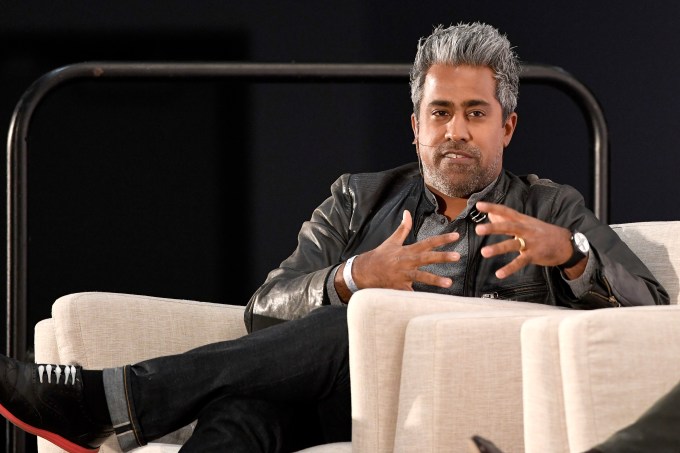
Greg Epstein: How would you summarize your argument in Winners Take All?
Anand Giridharadas: The heart of the argument is that we live in an age of staggering inequality, that is fundamentally about a monopolizing of the future itself. The winners of our age, the people who manage to be on the right side of an era of precipitous change and churn, have managed to build, operate, and maintain systems that siphon off most of the fruits of progress to them.
I don’t think there’s a person alive today who would deny that this has been a very fertile age for innovation. That there’s been no shortage of new stuff invented, new promise, new companies, new capital expenditure.
Take any measure of … I often joke, innovation is the Latin word for new shit. I don’t think anybody would say, “I feel shortchanged in the absolute level of new shit in this age.” I’m not sure what age you would preferred to have lived in.
I have never ever in my life had a meeting, or an interview with someone in finance who is like,”Well, our business is really about inspiring connection through money in our communities.”
But if you go to many, many societies, including the one you and I live in, but many others, and you ask people, “What about progress?”, which is most people’s lives getting better, in my definition, I think it would also be hard to deny that many, if not most people, in certainly the advanced countries, will tell you, “No. I haven’t experienced much progress, and I do feel shortchanged on that score.”
And so, if you start with the premise of how is it that we live in an age of tremendous innovation, and for so many people, so little progress, the answer is the winners of our age have cornered the fruits of innovation, so that they fail to translate into progress.
And, at the heart of what I’m trying to establish with the book, is how they have then turned around, and in response to this exclusion, and the anger it generates, sought to pass themselves off as change agents who can fix the problem that they are complicit in causing, and who can fight the fire that they helped set.
This is not the first generation of ultra rich people in history to seek to justify their own rule, but they’ve found a particularly ingenious way to do it, which is to seek to be the solution to the problem that they are still actively working to cause.
Greg: What do you say to the folks who would say it’s not just new shit, as you put it so well, but that all the new shit, even if there is more inequality, adds up to a better quality of life for everybody? That yeah, there is rising inequality, but everybody’s driving around in a car, everybody’s on the phone. People are by and large living longer. They’re living more healthily. They’re living with less violence.
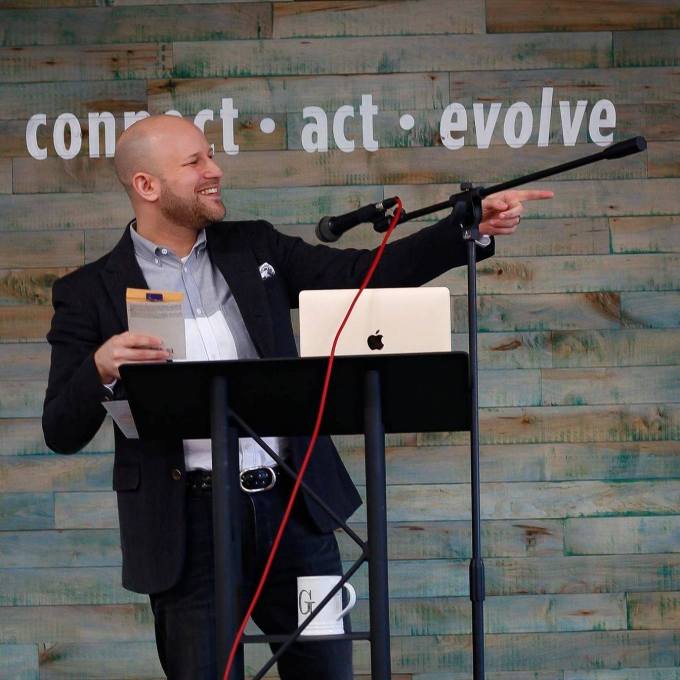
Anand: No. That’s false. Life expectancy has gone down, for the last three years, in America. Do people know that? Do the readers of TechCrunch know that life expectancy has gone down in America? Do the readers of TechCrunch know how rare that is in history, for life expectancy to go down?
Think about the last time you went to the doctor. Think about all the tests they do these days. We have two children. We have a one-year-old and a four-year-old. Between the birth, between the pregnancy with the four-year-old, and the pregnancy with the one-year-old, there were several new tests, and new technologies invented, that we had access to with the one-year-old, that weren’t ready yet when we had the four-year-old. That’s how much new shit there is. So, how is life expectancy going down?
I start the book with all these stats, and try to separate out the innovation from the progress. Literacy has not improved in America, even though all these books have been scanned. Another area that the TechCrunch reader would surely point to, as well, it’s become easier than ever to start your own business and be an entrepreneur. One third as many young people today own their own business, as they did in the 80s. One third as many. The average twelfth grader tests more poorly in reading today, than in 1992.
If you think about all the new tests, going back to that medical example, all the new diagnostics, all the new genetic work that has been done, it really actually requires a tremendous amount of rigging to have all of that go into one end of the machine, and have a decline in life expectancy come out of the other.
That’s not a natural occurrence. The natural occurrence would be for people to live longer, because of all the stuff that’s happened. You have to really jury rig the society, to ensure that somehow a very large number of people are unaffected by that positive stuff, and in fact are subjected to a bunch of negative stuff that the positive stuff can’t touch.
Tech and religion
Greg: I think what we’re told is that the positive stuff would not be possible, if it wasn’t for that jury rigging. And I think what you’re doing, and a number of people are doing, is pushing back against that narrative.
Anand: That’s at the heart of this whole thing. That is the religion that my book seeks to slay, is the religion of win-win-ism, which is a false religion. And it is a religion that says that it’s true in both its win-win form, and its inverse lose-lose form.
What win-win-ism says is, the best way to help the least among us is to do what’s good for the richest and most powerful. The best guide to what’s going to be good for America is going to be what’s good for Jeff Bezos, and Amazon, and Facebook, and Google, and Goldman Sachs. But, the inverse is also true. The win-win religion holds that if you do anything that has any cost, significant cost, for the winners of our age, you will only be hurting the most powerless among us.
Greg: I’m fascinated by the way you speak of win-win-ism as a religion — in the book you also talk about how high-powered consultants at places like McKinsey subscribe to a ‘religion of facts.’ And in a profile piece on Justin Rosenstein of Asana, you portray him sitting around a table in Silicon Valley, talking about community and saying a secular grace. It seemed like you were trying to show that what you call this “religion” even has its own rituals, its own congregations.
And it’s not just you: I’ve been studying the intersection of secularism and religion for almost 20 years, and now that I’ve started to work on the ethics of technology, I’ve noticed almost everyone I’m reading seems to refer to technology as a kind of secular religion. I’m wondering what’s going on there.
What’s the importance of using those terms, for you? How does that help your argument?
Anand: I think it’s actually helpful to understand as a religion to understand how removed it is from reality. Because, otherwise, you’re left with the puzzle of how can people at Silicon Valley continue to spread the narrative that as long as you sprinkle their algorithms on things, they will tend toward equality, justice, and emancipation.
They’re still spreading that narrative now. I mean, it’s blockchain today, and tomorrow it will be something else. But, we now have 25, 30 years of evidence that in fact these technologies played into existing power divides, and in many cases accentuated them.
I mean, with all the whole supposedly leveling tech revolution, fewer companies now run America than did before the tech revolution. And they all know this at some level. They understand the facts. They understand that we do live in this winners-take-all world that has been rich-splained to us as being some kind of new age of emancipation.
To my mind, the only way they can keep believing is as an act of faith. I don’t think it’s possible to look at the world right now, and objectively say what they continue to say, which is that them being in charge, these technologies being in charge, rich people doing more of what they have been doing, it’s gonna save us. You can only maintain this view if it’s a faith, constantly re-evangelized. And that’s why I think they spend so much time in conferences. I think if they were at home more, or in the office more, I think they would really fall prey to doubts.
Greg: The conference is sort of the revival meeting of the tech religion.
Anand: It is 100% a revival meeting, yes. And I think they need it.
Silicon Valley and Winners Take All

Greg: Venture capitalists are another parallel I see to religion. You mention how they are seen today as thinkers, philosophers. I tend to think of VC’s as priests in the tech religion. What reaction have you been getting from that community in particular? From tech VC’s, or from Silicon Valley as a whole?
Anand: I hear anecdotally, first of all, that Winners Take All has caused a lot of discussion in the Valley. People text me from dinner parties saying, “Oh my god, a fight just broke out at my dinner party about your book.” And I would say the Valley has probably been the most resistant to my critique. But a lot of people, even in the stratospheres I write about, understand that there is something badly wrong, the system needs to seriously change.
Even in the best possible case where you are a good person who made decent money, you have benefited from a system of taxation, for starters, that decided it was a greater priority to make sure you held on to as much of that money as possible than it was to make sure that people had decent schools in this country.
A lot of people reach out to me [privately] and say, “look, I don’t know quite how to get there, but I kind of agree with you that I’m living on top of an indefensible mountain here. And I’m not sure how to get down. I’m not necessarily even sure how I got up here, but I’m aware that this is an indefensible mountain, and I’m aware that I should not be on it. Let’s talk.” But, in Silicon Valley in general, I think there has been the most resistance. Because [many] are truly possessed of the feeling that leaving them alone, and letting them do whatever they want to do, and grow however they want to grow, is what is best for the world.
My best read on someone like Mark Zuckerberg is that he sincerely feels that he was a rare, lucky person in history who has the privilege of having certain knowledge, and insight, and an idea that if he is left alone to pursue to its fullest will emancipate the world more than maybe any government, more than maybe any social movement, etc. I think Zuckerberg genuinely feels, and I have sort of come to understand this from people who know him, and understand how he thinks, that journalists asking him questions, or regulators pushing back, are essentially deferring his emancipation of the world. I don’t think that makes him … I don’t think he is a cynic. And that’s why he is so difficult to deal with. I think he is a true believer. But that makes him in some ways even more difficult for us to deal with.
Greg: I mean, in the religion metaphor that would make him more like a Messianic figure.
Anand: Which he absolutely is.
Greg: Right. In religious history, some Messianic figures actually believe their Messianism.
Anand: Right. And I think in some ways our society is better protected against a Goldman Sachs fighting for bad policy in Washington, making a bunch of money on it, and then throwing five million dollars at a women’s shelter. We’re not great at it, but if you think of the financial industry, we regulate the hell out of them. It’s not perfect, but we are all up in their grill.
There are people at the SEC watching every trail. And I think that’s because everybody understands the game, like, they’re trying to make money. I love people in finance, because no one in finance has ever tried to convince me that they’re not in finance, or they’re not motivated by finance.
I have never ever in my life had a meeting, or an interview with someone in finance who is like, “Well, our business is really about inspiring connection through money in our communities.”
Greg: I have actually had that exact meeting, by the way.
Anand: That’s kind of amazing. But, in general, people in finance own the idea that they work in finance. Whereas, with tech, I think a lot of our culture has bought into the idea that there are these figures of emancipation, and liberation, and social leveling. And it has bought them a tremendous [amount] of space and freedom that they have exploited and abused.
A newer generation is thinking differently?
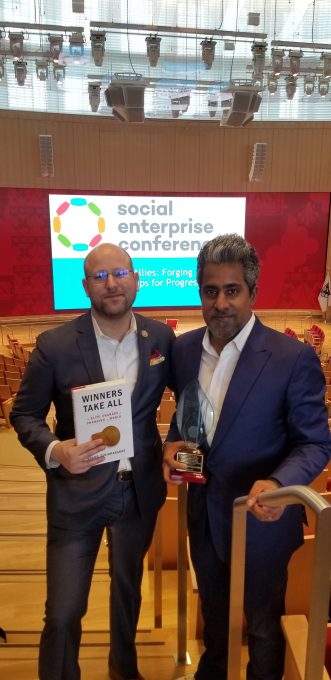
Greg: You are going to be a guest, a few days from when we’re having this conversation, at a big conference at Harvard Business School. You’ll be there in part because you’re receiving an award from my office. But, the reason you were selected for this award is that I was approached by Harvard Business School students, with whom I work, who said to me that there are people at Harvard Business School who are sincerely questioning what they have taught there in previous generations. And want to do things differently.
A student came to me and said that in her class, currently, they’re grappling with the idea that they [at HBS] are the people who produced Enron through their own curriculum. But, what is your response to the idea that people at a place like Harvard Business School are trying to think differently about how they do things? And that your book is something that they’re reading, and trying to figure it all out. Is that a positive for you? Are you skeptical?
Anand: All of the above. It makes me very happy when folks at Harvard Business School and these other kinds of citadels of power feel like they’ve been challenged by [my book], and feel like they want to act on it, have discussions. That’s why I write.
On the other hand, what I’m most trying to do here is not coax the people inside the citadels to think a little differently. I think the real change that has to happen is convincing everybody else to stop outsourcing the changing of the world to those with the most to lose from surrendering the status quo.
I have made it a practice to never be the journalist who quotes cab drivers. But, being on book tour recently, I got a lot of Uber drivers. And I have a chapter where I talk about Uber and Lyft. And it’s so interesting how those drivers are like, “Yeah, you’re right. They do always say this change the world thing, but I just keep getting paid less.”
Joining the status quo
Greg: I want to ask you a little bit about Hilary Cohen, because you start the book with her. This young idealistic person who ends up working at McKinsey, and is now teaching the ethics of technology at Stanford. Are you in touch with her?
Anand: I am still in touch with her. I don’t know much about the course, but she is great. She had a very interesting journey. I started the book with her because this can’t just be a story about a plutocratic hijacking.
One thing I can tell you, that I don’t think I have told anybody else, is the original title of the book when I submitted it without any consultation with anybody, I just had to put something on it to submit it, before I hugely rewrote it, that original submission was called Hijacked. I think one of the subtitles was The Hostile Takeover of Changing the World. You can’t understand the hijacking, however, solely as this aggressive act by the plutes. You have to also understand how they kind of pulled it off by kind of gassing everyone into a stupor through culture.
And a part of what they did was invent a set of cultural values and ideals, cultural reflexes that justified their position on top. I wanted to start the book not with the hijacking itself, but with a young person misdirected by this culture the plutocrats have spun.
And Hilary was the perfect example of a person who had huge ideals of changing the world for millions of people, making the world a better place. She read Aristotle and similar things in college, and with idealism, strolling the Quadrangle of Georgetown. And then she was influenced by this well-funded but fraudulent claim that suffuses these campuses, that if you don’t apprentice in the most status quo-ey of the status quo institutions, the institutions with the most to lose from change, you won’t know how to make change.
And, I mean, the pitch is literally as if arsonist gangs convinced aspiring firefighters that if you don’t spend a year or two with us, what kind of firefighter will be you? What will you know about fire? You have to set some fires to fight some fires. And it’s an idea that’s both laughable and incredibly powerful and influential. And it grabbed Hilary like it’s grabbed so many.
Movements and the many helping the many

Greg: As one alternative, you talk about idea of the many helping the many. Before the age of modern philanthropy we didn’t really have one, or two, or few individuals just trying to do such an outsized share of good. We had a lot of people helping a lot of people. We had public institutions that were more robust, at least relative to their age, than ours are now. What do you think the many helping the many today would look like?
Anand: The most important rising word in our time is movement. Genuine political movements and civic movements that put pressure on public officials and others to solve problems at the root for everyone. Instead of the way those problems tend to be solved when they are solved from on high, which is in ways that help a few make big display cases out of them, and leave a bad system in place. And movements are just so crucial.
A lot of people vaguely don’t like Facebook, but there is no movement against it, trying to get people in government to make it an antitrust issue. We have forgotten how to do this. In no way do I want to minimize the Vietnam War, and the tremendous amount of death [it caused]. But it’s at least a reasonable argument to make, that Donald Trump presents a more existential threat to the United States than even the Vietnam War did. And yet, the Vietnam War routinely shut the country down, and created disruption. Things were occupied, blocked.
I don’t think we can get out of the present situation without the victors of our age losing something, sacrificing something, for the greater good.
What has come to a halt in the Trump era? What have students occupied in a serious way? I don’t think my life has been disrupted in New York City once in the two years of the most dangerous president in American history. I think that’s actually very weird. I don’t think there has been a single street that’s been blocked as I have tried to cross it in the last two years.
There’s been a march here and there, but why are campuses functioning right now? Why hasn’t there been a single general strike?
Greg: I guess your answer would be, because the people who might be organizing those kinds of mass demonstrations have converted to this religion of win-win-ism?
Anand: I think we told a lot of the people who might be leading those kinds of things that the better way to make a change is to start an app, or start a business, or an ice cream company that gives back, or a sock company that gives a sock to someone in Africa for every sock you buy.
Greg: Right. And part of it seems to be that that those people who are doing that, they may not be actually changing the world for the better, but they have certainly changed their own lives for the better.
Anand: Right. But, there is a counterexample that’s important. You see it with AOC and others, where you do have movement politicians on the rise. They’re starting to demonstrate that when you have huge energized crowds behind you on a set of ideas, you can actually make change on a scale that dwarfs that of all these private initiatives.
Greg: Did you see the, sort of, mutual rejection of Amazon in New York as part of that?
Anand: Yes. And I think a lot of people mischaracterize this as New York losing Amazon. It is Amazon losing New York. New York’s been here 400 years. I’ll make a very safe prediction. At some point, Amazon will cease to exist as a company, it happens to almost all companies. I don’t mean that as shade, no company lasts forever. I assure you New York City will be here when Amazon is not.
A litany of bad behavior by billionaires
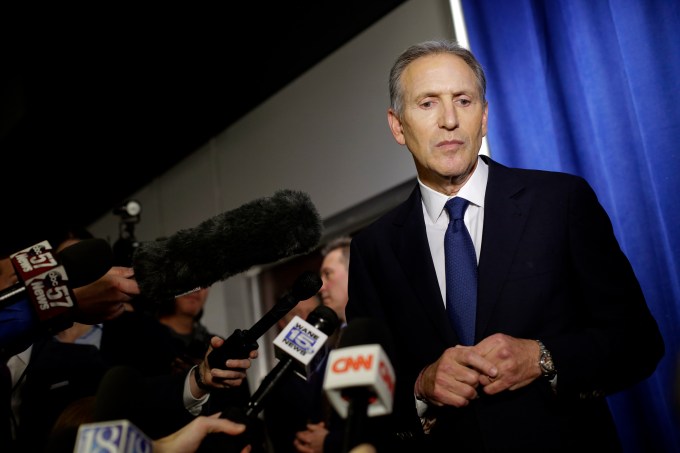
Greg: And, in addition, one of the really interesting phenomena, it is part of this, is that as Amazon was losing New York, Jeff Bezos was having a really odd time to say the least. And it has been seemingly an odder time than most for billionaires in the times since your book came out.
Anand: Yeah, I got to thank them for that. I am very grateful [prominent billionaires have] done an enormous amount of crazy shit in the precise period of my book tours. It’s been very, very helpful.
Greg: I don’t want to pile on, but it seems worthwhile to mention Robert Kraft as well.
Anand: Let’s just go down the list. Just in the last few months. You got Robert Kraft. You got Jeff Bezos giving money away, getting embroiled in this whole drama. You have got Howard Schultz with possibly the worst presidential debut of my lifetime, managing to call two women of color un-American in the first 24 hours with their policy ideas. You have Michael Bloomberg shooting himself in the foot by saying Medicare for All would bankrupt America, and bring us to its knees. But, what he was really saying is “I would rather not pay those taxes.”
In a fairer world, you won’t be able to destroy the planet by operational daylight, and do a small initiative to acquire the glow of saving it by philanthropic moonlight.
You have Facebook unraveling before our eyes as this institution. You have the entire Amazon HQ2 debacle. And I could go on example after example, after example of how the very people who we have been promised are our saviors are lo and behold self-interested, highly privileged people using their platforms to keep themselves safe.
And there is nothing wrong with using a platform to keep yourself safe, unless you’re trying to pass that off as selflessness.
Greg: Yeah. Douglas Rushkoff, who I’m also going to speak for this series, has a great piece about how a couple of billionaires paid him a boatload of cash to fly down and meet them at an ultra-luxury resort so he could answer their questions, and what they really wanted to know about was, when “the event” happens, how will they retain of the loyalty of their security forces inside their bunkers? This was what they really, really most wanted to know about.
Anand: That’s crazy. Crazy.
Billionaire identity politics?
Greg: It’s a good question, actually, if you think about it. But seriously, what should we make of billionaires, today? They are in many cases the most admired individuals of the past generation, and now in huge platforms like the New York Times, we’ve begun to debate whether they should even exist.
Anand: We are living through the rise of a new billionaire identity politics that is fascinating. I passed on a question to Andrew Ross Sorkin, who asked it of Howard Schultz at an event. I said, “Do you think billionaires have too much power in American life? And how do you propose to reduce it?” Schultz objected to the phrasing of the question, and said, “I don’t like the term billionaire. We prefer to be called people of means.”
So just as you have people of color, there is now people of means.
Greg: Have you ever heard that before? I have never heard that before.
Anand: No. But, it is part of this larger, kind of, billionaire identity politics where … I get notes, from centimillionaires and billionaires, and DMs that are literally like, “Well, you said this harsh thing about the plutocratic class, but I just want you to know it’s not all of us.” So not all billionaires is the new not all men, not all white people. And I think there is actually a really strong analogy there.
No one that talks about dismantling white supremacy is saying all white people are bad. It is saying that it’s hard to be white, and not somehow participate in that system. No one is talking about male supremacy, and rape culture, and those kind of things, and saying that all men are rapists, or all men are bad. But, again, it’s hard to be a man and somehow not have participated and benefited from the culture that prevails between men and women.
And similarly, the kind of capital supremacy, if you will, that I’m proposing to dismantle, does not suggest that all capitalists are bad people. This is not about individual morality; this is about transcending the lens of the individual, and understanding that even if you made your money honorably and nobly, and never swindled anybody, and just had a product that a lot of people liked; or, you’re Serena Williams, and you made a bunch of money in tennis.
Even in the best possible case where you are a good person who made decent money, you have benefited from a system of taxation, for starters, that decided it was a greater priority to make sure you held on to as much of that money as possible than it was to make sure that people had decent schools in this country.
And therefore, regardless of your individual morality, you have benefited from a system that we might properly understand as a kind of large-scale crime. And that’s not to say you’re a bad person, but it’s to say it’s a complicated spot to be in.
Will a fairer world deplete Silicon Valley and other rich institutions
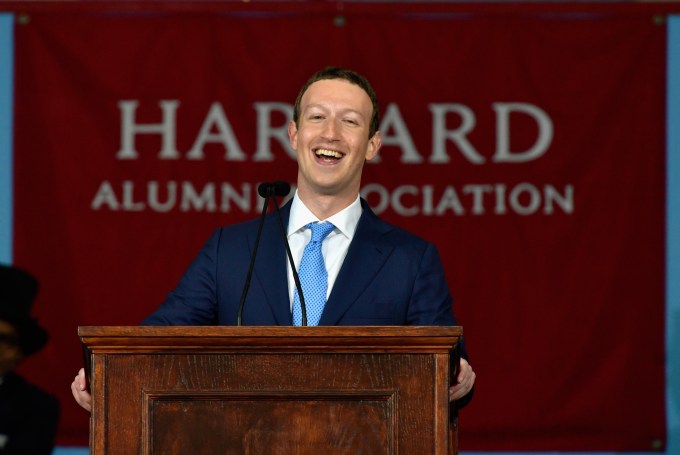
Greg: I think for a lot of people who are trying to take in your argument, and are in a position to potentially divest themselves from some of the profits that they have made by being part of the system, is that it’s just really hard to imagine what a university like Harvard would look like, or what an economic engine like Silicon Valley would look like if they weren’t causing these kinds of problems.
Does Harvard continue to exist as we know it? Does Silicon Valley continue to exist as the extraordinary destination for progress and technological change that we know it as if the people in it were to take your argument seriously, and do something about it?
Anand: I think the answer to a winners-take-all world is a world in which the winners take less. And, therefore, I don’t think we can get out of the present situation without the victors of our age losing something, sacrificing something, for the greater good. And I think that is the core taboo of our time. Sacrifice by the elite, and in many cases coerced sacrifice, not voluntary sacrifice, may be what is required for the, kind of, commonwealth to flourish.
And so let’s just be real. In a fairer world, people may have three homes instead of four, or two instead of three. In a fairer world where Harvard is not willing to let rich people dictate what kind of centers it creates, Harvard may be able to raise less money. In a world with a more equitable tax system, there will be less money [for you to give away] in the first place, but there will also be less of a need to give it away.
In a way fairer world, rich people in their 60s, and 70s, and 80s without much to do won’t be able to use a little bit of giving to get invited to fund board meetings, and tell public schools or charter schools how to run themselves. Because, we won’t consult them on that.
In a fairer world, you won’t be able to destroy the planet by operational daylight, and do a small initiative to acquire the glow of saving it by philanthropic moonlight. And so, yeah, the world that I’m calling for is a world that’s going to be really great for most people. But, it’s going to ask, and actually not ask. It’s going to demand that the plutocrats stop hoarding the rainwater of progress.
Greg: The idea of sacrifice reminds me of World War II and The Greatest Generation. Did you choose it purposely in that way?
Anand: No, but I think that’s a good example, out of many. Win-win-ism and this entire culture I’m sketching are designed to deny the idea of sacrifice. The whole charade is about being able to do the work of justice without costing yourself a thing. People will say, “Well, this is zero-sum thinking.” And here is the thing: resources. When you talk about money and resources, you can expand the pie instead of cutting it up more. But, power is zero-sum.
If a handful of three companies has 80% of the say in Washington on what antitrust happens, because of lobbying, campaign contributions, and the studies [they] fund, that is a fixed pie. The fixed pie of power, and how much your voice counts versus others. And the only way for me to get more than, for the public good to have more than 20% of its say in that conversation is for you to have less than 80. It is of necessity that the powerful have less power for justice to be done. Saying that is the great taboo of our time.
Optimism and the future
Greg: How optimistic are you at the end of the day about the prospects for our human future?
Anand: I think, my answer is one probably shouldn’t be optimistic during the most dangerous presidency in American history; however, I actually do feel profound optimism about one thing, which is that I think this country is at a turning point.
For the last 40 years we have been governed by this ideology that money was going to save us, that business people were the best stewards of the public good, that entrepreneurs were heroes.
What does make me optimistic in what is otherwise a time of despair is that I think there is a very real shot that we are seeing the last gasps of the age of capital, and the first flushes of an age of reform.
Greg: Well, that is a hopeful note to end on. Scary, but also hopeful. Thank you so much for your time.































Comment